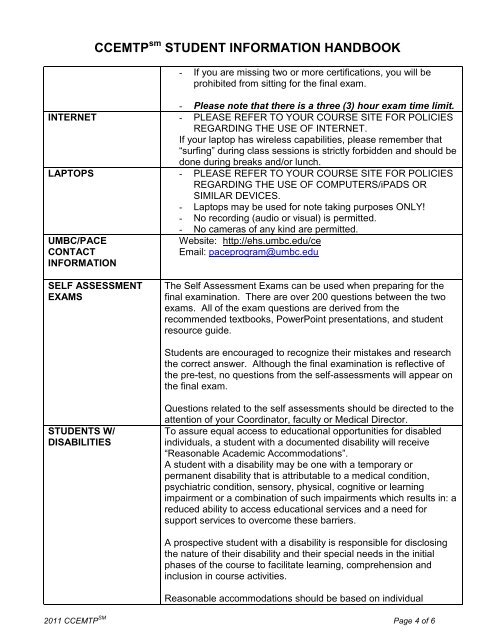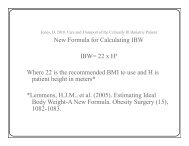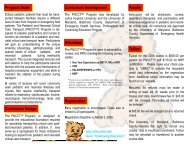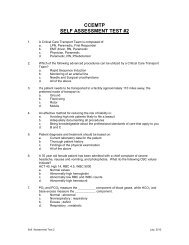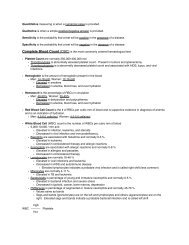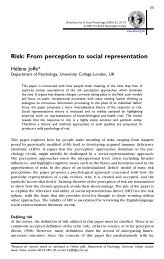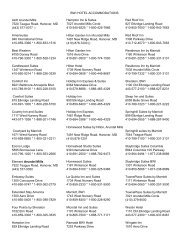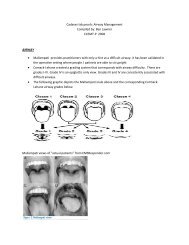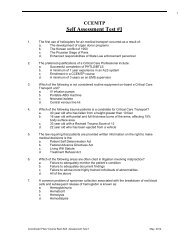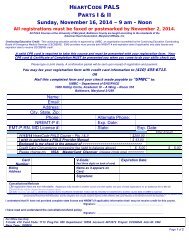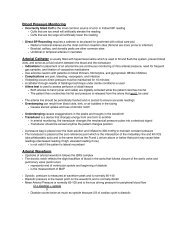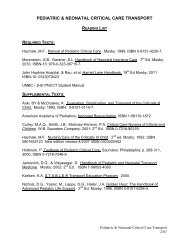student information handbook - UMBC Department of Emergency ...
student information handbook - UMBC Department of Emergency ...
student information handbook - UMBC Department of Emergency ...
You also want an ePaper? Increase the reach of your titles
YUMPU automatically turns print PDFs into web optimized ePapers that Google loves.
CCEMTP sm STUDENT INFORMATION HANDBOOK<br />
- If you are missing two or more certifications, you will be<br />
prohibited from sitting for the final exam.<br />
- Please note that there is a three (3) hour exam time limit.<br />
INTERNET - PLEASE REFER TO YOUR COURSE SITE FOR POLICIES<br />
REGARDING THE USE OF INTERNET.<br />
If your laptop has wireless capabilities, please remember that<br />
“surfing” during class sessions is strictly forbidden and should be<br />
done during breaks and/or lunch.<br />
LAPTOPS - PLEASE REFER TO YOUR COURSE SITE FOR POLICIES<br />
REGARDING THE USE OF COMPUTERS/iPADS OR<br />
SIMILAR DEVICES.<br />
- Laptops may be used for note taking purposes ONLY!<br />
- No recording (audio or visual) is permitted.<br />
- No cameras <strong>of</strong> any kind are permitted.<br />
<strong>UMBC</strong>/PACE<br />
CONTACT<br />
INFORMATION<br />
Website: http://ehs.umbc.edu/ce<br />
Email: paceprogram@umbc.edu<br />
SELF ASSESSMENT<br />
EXAMS<br />
The Self Assessment Exams can be used when preparing for the<br />
final examination. There are over 200 questions between the two<br />
exams. All <strong>of</strong> the exam questions are derived from the<br />
recommended textbooks, PowerPoint presentations, and <strong>student</strong><br />
resource guide.<br />
Students are encouraged to recognize their mistakes and research<br />
the correct answer. Although the final examination is reflective <strong>of</strong><br />
the pre-test, no questions from the self-assessments will appear on<br />
the final exam.<br />
STUDENTS W/<br />
DISABILITIES<br />
Questions related to the self assessments should be directed to the<br />
attention <strong>of</strong> your Coordinator, faculty or Medical Director.<br />
To assure equal access to educational opportunities for disabled<br />
individuals, a <strong>student</strong> with a documented disability will receive<br />
“Reasonable Academic Accommodations”.<br />
A <strong>student</strong> with a disability may be one with a temporary or<br />
permanent disability that is attributable to a medical condition,<br />
psychiatric condition, sensory, physical, cognitive or learning<br />
impairment or a combination <strong>of</strong> such impairments which results in: a<br />
reduced ability to access educational services and a need for<br />
support services to overcome these barriers.<br />
A prospective <strong>student</strong> with a disability is responsible for disclosing<br />
the nature <strong>of</strong> their disability and their special needs in the initial<br />
phases <strong>of</strong> the course to facilitate learning, comprehension and<br />
inclusion in course activities.<br />
Reasonable accommodations should be based on individual<br />
2011 CCEMTP SM Page 4 <strong>of</strong> 6


